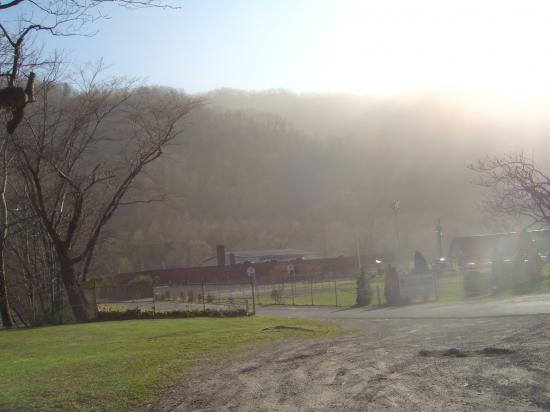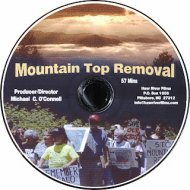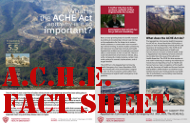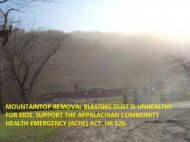
Bill to Halt New Mountaintop Removal Introduced In US House
Feb 1, 2017
Reps. Yarmuth, Slaughter Introduce Bill to Halt New Mountaintop Removal Coal Mining: Legislation would pause permitting while officials assess health dangers Call your US representatives and urge them to support the ACHE Act, H.R. 786. Find them at http://www.house.gov/htbin/findrep
Call your US representatives and urge them to support the ACHE Act, H.R. 786. Find them at http://www.house.gov/htbin/findrep
WASHINGTON – Today, Rep. John Yarmuth (KY-3) and Rep. Louise Slaughter (NY-25) reintroduced the Appalachian Community Health Emergency Act, legislation that requires the first comprehensive federal study of the health dangers of mountaintop removal coal mining. The ACHE Act, H.R. 786, places a “time out” on all new mountaintop removal mining permits until federal officials determine that the controversial process does not pose a threat to the health of surrounding communities.
Rep. Yarmuth said, “Mountaintop removal poses a dangerous threat to clean air, clean water, and the health and safety of the residents of coal communities throughout our nation. As this administration is sure to expand the use of this reckless practice, it’s imperative that our government conduct a comprehensive federal study of the health risks of this harmful mining method and provide coal community families with the information and answers they are rightfully owed. I believe mountaintop removal should be banned, but at a minimum we should halt all new permits until the safety of the residents in the surrounding communities is assured.”
“Every American has a right to live and raise their family in a safe and healthy environment,” said Rep. Slaughter, a native of Harlan County, KY whose father was the blacksmith for a coal mine. “Reckless, profit-driven mining practices that contaminate the air and water all too often infringe on that right and put the health of entire communities at risk. The scientific evidence is clear, and we should place a moratorium on further mountaintop coal removal until we can ensure that families in these communities are safe.”
The ACHE Act would require the Department of Health and Human Services to conduct a comprehensive study to determine the health effects of mountaintop removal mining.
In 2014, a team of scientists from West Virginia University released the first-ever study showing a direct connection between mountaintop removal coal mining dust and effects on human-derived lung cell cultures, turning them into tumor-promoting cells. This important study is consistent with a growing body of over two dozen scientific studies of significantly elevated rates of cancer, heart disease, birth defects and other illnesses in communities near mountaintop removal, even after accounting for other factors. Cancer and premature deaths are higher in the Appalachian region compared to the national average, and death from lung cancer in particular is higher among people living within coal-mining areas of Appalachia.
In mountaintop removal mining operations, coal companies use explosives and heavy machinery to remove the upper levels of mountains to access the coal seams underneath. Mine operators often dispose of the waste in adjacent valleys, where it buries and pollutes streams. The fine blasting dust, composed mostly of glassy silica with other pollutants, can travel for several miles from the blasting site. The World Health Organization classifies airborne particulates as “carcinogenic to humans.”
The House Natural Resources Committee is presenting today a resolution to apply the Congressional Review Act to repeal the Stream Protection Rule, which is intended to prevent water pollution from coal mines. The Obama administration finalized the rule after nearly eight years of development. The CRA allows Congress 60 days to review the SPR and pass a law that voids the rule. The Trump administration has made clear its intent to deregulate polluting industries. The ACHE Act is the only legislation designed to end mountaintop removal.
“Donald Trump’s pressing attacks on the EPA and the Stream Protection Rule render the ACHE Act the most crucial piece of legislation on health and environment now before Congress,” said Bo Webb of Naoma, W.Va., coordinator of the ACHE campaign. “Given his fondness of the executive order, Trump, with the stroke of his pen, could easily place a freeze on mountaintop removal surface mine permits and order a definitive health study. He may feel he has taken actions to protect Americans from possible acts of terror from refugees, but he and his predecessors have failed to protect Appalachian Americans from mountaintop removal.”
“Coal companies are blowing up the mountains where I live,” said Vickie Terry of Claiborne County, Tenn. “We've seen alarming increases in cancer and other illnesses since mountaintop removal began here, and we deserve answers. Our health is not considered in the permit decisions, even though there are more than two dozen peer-reviewed studies linking deadly health impacts to mountaintop removal. To protect the health of my family and community, we need the ACHE Act.”
“An ounce of prevention is worth a pound of cure,” said Kathy Selvage of Wise County, Va. “We should be doing all we can to prevent serious illness and early death, especially when so many people stand to lose their healthcare coverage. The ACHE Act would implement the precautionary principle, requiring that an activity or product be demonstrated as relatively safe before approval. All our evidence so far is that mountaintop removal is creating a public health crisis. I have witnessed in my own community increased cancer and other debilitating illnesses related to mountaintop removal, diminishing the quality of life and bringing on early death.”
Michael Brune, executive director of the Sierra Club, said, "Mountaintop removal coal mining has been harming the health of Appalachian families for decades, with little to no accountability for the coal companies responsible for the devastation. It's essential that we stand up for families and their health by passing the ACHE Act, which would suspend mountaintop removal and begin a comprehensive health study, so that policymakers can see for themselves that this irresponsible practice must end."
“The mountains are blown to pieces, the communities are scattered and the few of us who have stayed and tried to save what is left are facing death from the polluted air,” said Lisa Henderson Snodgrass of Rock Creek, W.Va. “The only way to fix this, the only justice we can be given, is the passage of the ACHE Act.” Snodgrass’s mother, Goldman Environmental Prize winner and Coal River Mountain Watch executive director Julia “Judy” Bonds, died of cancer in 2011.
Joining Reps. Yarmuth and Slaughter as original cosponsors of the ACHE Act are:
Gerry Connolly (VA-11)
Diana DeGette (CO-1)
Betty McCollum (MN-4)
Paul Tonko (NY-20)
Matt Cartwright (PA-17)
Jan Schakowsky (IL-9)
Eleanor Holmes Norton (DC)
Don Beyer (VA-8)
Raul Grijalva (AZ-3)
Peter DeFazio (OR-4)
Barbara Lee (CA-13)
Adam Schiff (CA-28)
Earl Blumenauer (OR-3)
Jerry McNerney (CA-9)
###













